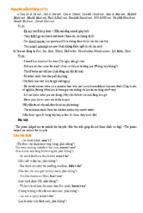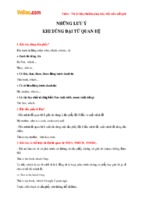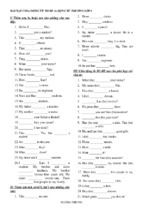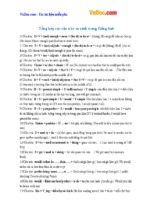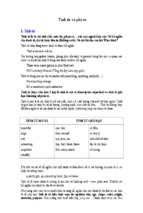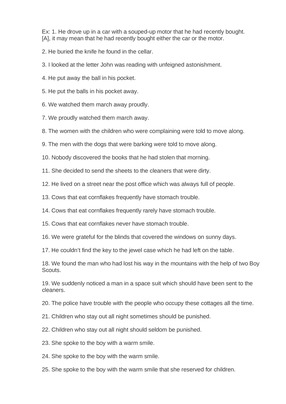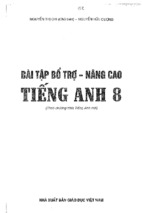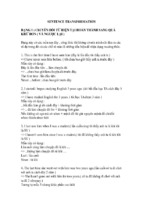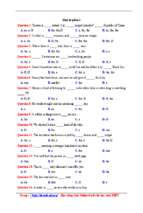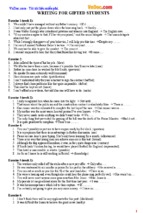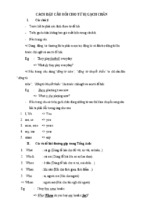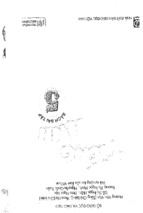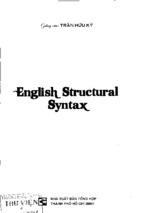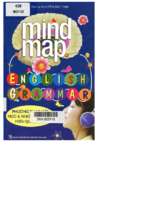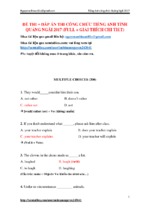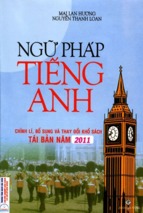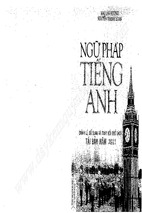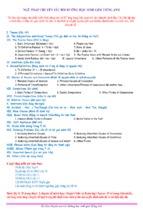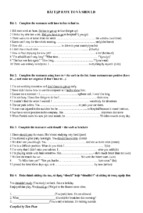Sách học sinh tiếng Anh 8 thí điểm tập 1 bằng file pdf
%22.�0$3
Reading
Listening
Unit 1:
Leisure activities
- Reading for general and
specific information about
the possible effects of
spending too much time on
the computer
- Listening for specific
information about ways of
spending time with friends
Unit 2:
Life in the
countryside
- Reading for specific
infomation about an unusual
lifestyle in the countryside:
Mongolian nomadic life
- Listening for specific
information about changes in
the countryside
Unit 3:
Peoples of Viet Nam
- Reading for specific
information about an ethnic
group
- Listening for specific
information about a
traditional speciality
Unit 4:
Our customs and
traditions
- Reading for specific
information about family
customs and traditions
- Listening for specific
information about a
traditional dance of an ethnic
group in Viet Nam
Unit 5:
Festivals in Viet Nam
- Reading for specific
information about two
festivals in Viet Nam
- Listening for general and
specific information about a
traditional festival
Unit 6:
Folk tales
- Reading for specific
information about a fairy tale
- Listening for specific
information about a fairy tale
REVIEW 1
REVIEW 2
4
BOOK MAP
Speaking
Writing
Language Focus
- Talking about ‘good’
and ‘bad’ sides of leisure
activities
- Writing to discuss an
opinion about leisure
activities
- Verbs of liking + gerunds
- Verbs of liking + to-infinitives
- Clusters: /br/ and /pr/
- Talking about what you
like or dislike about life in
the countryside
- Writing about changes in
the countryside.
- Comparative forms of adjectives: review
- Comparative forms of adverbs
- Clusters: /bl/ and /cl/
- Talking about life of an
ethnic group
- Writing about how to cook
a traditional dish
- Questions: review
- Articles (some uses)
- Clusters: /sk/, /sp/ and /st/
- Talking about family
customs and traditions
- Writing about a
traditional dance
- Should and shouldn’t: review
- have to
- Clusters: /spr/, /str/
- Talking about the
reasons for going to a
festival and the things to
take when attending a
festival
- Writing about a festival
- Simple sentences and compound
sentences: review
- Complex sentences
- Stress of words ending in –ion and –ian
- Talking about a legend/
folk tale/ fairy tale/ fable
- Narrating a legend/ folk
tale/ fairy tale/ fable
- Past simple: review
- Past continuous
- Intonation in exclamatory sentences
BOOK MAP
5
8QLW
/(,6
/(,685(�$&7,9,7,(6
6
THIS UNIT INCLUDES:
*(77,1*�67$57('
VOCABULARY
,WuV�ULJKW�XS�P\�VWUHHW�
PRONUNCIATION
Leisure activities
Clusters: /br/ and /pr/
GRAMMAR
Verbs of liking + gerunds
Verbs of liking + to-infinitives
COMMUNICATION
Talking about leisure activities
Organising your ideas
�
Listen and read.
Mai: Check out this book, Phuc. ‘My Mini Guide
to Dog Training’.
Nick: Ha ha, not sure about that. But I think I’ll enjoy
listening to the melodies.
Phuc: Sounds great! Max’ll like it too. Last weekend
we learnt some tricks. I love to watch him. It’s so
much fun… Have you found your craft kit?
Phuc: Look at the language website I sent you. It’ll
help you learn Vietnamese more easily.
Mai: Yes, I’ve found this one. It’s got everything:
beads, stickers, wool, buttons… I don’t
know, it’ll take all my savings.
Phuc: But it’s right up your street! Nick, what’s that?
Nick: It’s a CD of Vietnamese folk songs. I’ll listen
to it tonight.
Mai: And you’ll be able to improve your Vietnamese!
6
Unit 1/ Leisure Activities
Nick: Yes, I liked reading Doraemon comics while
I was learning Japanese.
Phuc: Stop reading comics! I’ll bring you my
favourite short story this Sunday when we
play football.
Mai: Sorry but we have to hurry. Mum and dad
are waiting. We need to buy some tools to
build a new house for Max this weekend.
D
�� Find words/ phrases in the box to describe the
Circle the correct answer.
photos. Then listen to check your answers.
1. Phuc, Mai, and Nick are in a library/ bookstore/
sports club.
2. Phuc is looking for a book/ dog/ craft kit.
3. Max is Phuc’s cat/ goldfish/ dog.
4. Mai has found a book/ CD/ craft kit for herself.
5. Nick’s CD is of folk music/ pop music/ rock music.
6. Nick is trying to learn Vietnamese/ Japanese/
English.
playing beach games
playing football
making crafts
playing computer games
texting
visiting museums
doing DIY
E� Which leisure activities do you think Phuc,
Mai, and Nick have? Tick ( ) the boxes. Then
find the information from the conversation
to explain your choice.
Phuc
Mai
1. _____________
2. _____________ 3. _____________
4. _____________
5. _____________ 6. _____________
Nick
1. pet training
2. making crafts
3. reading
4. listening to music
5. learning languages
6. playing sports
7. helping parents
with DIY projects
Learning tip
DIY: Do It Yourself: Work on the house that
you do yourself without the help of experts,
e.g. painting a room, fixing the garden fence,
building a dog house, etc.
F
Answer the questions.
�
Complete the following sentences with the
words in the box. In some cases, more than
one answer can be relevant.
good
satisfied
relaxing
exciting
fun
boring
1. You do leisure activities in your free time and they
make you feel _______________.
2. You can do _______________ activities such as yoga,
or _______________ ones such as mountain biking or
skateboarding.
3. Hobbies such as making crafts or collecting things
are _______________.
4. You can surf the Internet but some people say this
is _______________.
1. What does Mai mean when she says ‘Check out
this book’?
5. You can spend time with family and friends, or
become a volunteer for the community. This will
make you feel _______________.
2. What does Phuc mean when he says ‘It’s right up
your street!’?
�� *$0(�
&+$1*,1*�3$571(56
Choose one leisure activity from � or �.
In pairs, talk about it. Try to keep going for
one minute each. When the time is up, find a
new partner and talk about another activity.
You may:
describe the leisure activity
say if you have done this activity or not
share your feelings about the activity
7
Unit 1/ Leisure Activities
$�&/26(5�/22.��
Vocabulary
�
Look at the following pie chart on leisure activities in the US and answer the questions.
Leisure time on an average day
Relaxing and thinking
(17 minutes)
Other leisure activities
(18 minutes)
Using the computer
for leisure
(25 minutes)
Watching TV
(2.8 hours)
Doing sports
and exercise
(19 minutes)
Reading
(20 minutes)
Socialising and
communicating
(39 minutes)
TOTAL LEISURE AND
SPORTS TIME = 5.1 HOURS
NOTE: Data include all persons aged 15 and over. Data includes all days of the week and are annual averages for 2012
SOURCE: Bureau of Labor Statistics, American Time Use Survey
1. How much leisure time did people in the US
have on an average day in 2012?
�
2. What did they do in their leisure time?
1.
2.
3.
4.
5.
6.
7.
8.
3. What were the three most common activities?
�� Complete the table with information from the
a. Learning something interesting
pie chart.
Name of activity
relaxing
Look at the words. Match them to the category
labels.
skateboarding, football, badminton
a novel, poetry, a magazine
the news, a reality show, a comedy
a new language, a skill
collecting stamps, making origami
going to local performances, visiting museums
visiting relatives, going shopping, doing DIY
texting, going to the cinema, hanging out
b. Reading
Verb
c. Spending time with family
d. Having hobbies
relax
f. Watching TV
e. Playing sports
g. Socialising with friends
h. Going to cultural events/ places
Now add more words to each category.
�
8
Unit 1/ Leisure Activities
How much time do you spend a day on leisure
activities? What are the three activities that you
do the most? Share your ideas with a partner.
$�&/26(5�/22.��
Pronunciation
Clusters: /br/ and /pr/
Grammar
�� Complete the words under the pictures with
Verbs of liking + gerunds
Verbs of liking + to-infinitives
/br/ or /pr/. Listen to check your answers and
repeat.
If we want to follow a verb with
another action, we must use a
gerund or an infinitive.
�
1. a ____icot
2. ___ridge
Read the conversation in Getting Started
again. Underline verbs that are followed by
a gerund.
Look out!
3. _____acelet
The verbs love, like, hate, and prefer
can be used with both gerunds and
to-infinitives without much change
e
in meaning.
She loves going out with her friends.
= She loves to go out with her friends.
4. ______ead
Learning tip
5. ______incess
Verbs of liking
adore
love
cy
like, enjoy, fan
d
in
m
don’t
e
dislike, don’t lik
hate
detest
6. _____esident
�
7. _______esent
�
Tick ( ) the appropriate box. Then listen to
check.
followed by followed by both gerund
gerund only and to-infinitive
8. ________occoli
Listen and repeat.
1. She loves making apricot jam.
1. love
2. enjoy
2. My dad likes making bread in his free time.
3. Hien is our club president.
3. detest
4. Mai keeps all her bracelets in a beautiful box.
5. You will need a brush if you want to paint
your room.
6. This is a wonderful present. Thanks so much!
9
Unit 1/ Leisure Activities
Degree
4. prefer
5. fancy
�� Write the correct form of the verbs.
�
Look at the following email that Minh Duc
wrote to a new penfriend.
Hi, my name’s Duc.
How are you? This is what I like
do in my free time. I often play
video games or watch TV. Or I
go to the park and play football
with my friends. I enjoy do this
very much! I sometimes help my
parents too. If I have homework,
I’ll try to finish it first before I
do anything else. But I don’t
like have lots of homework !
I don’t mind to do homework
but I hate spend all evening on
it! On Saturday or Sunday, I love
eat out with my family. The food
is delicious!
What about you??
Best,
Duc
1. Mai enjoys ____________________ (make) crafts,
especially bracelets.
2. People in Britain love _______________ (watch) TV
in their free time.
3. Do you fancy _______________ (skateboard) in the
park this Sunday?
4. Nick likes ________________ (learn) Vietnamese.
D
There are six grammar mistakes in his email.
Can you find and correct them?
E
Answer the questions.
5. Ngoc hates ___________________ (sit) at the
computer for too long.
�
Write sentences about what you like or don’t
like doing in your free time, beginning with
the following. Then share what you have
written with your partner.
1. I adore ______________________________________.
2. I love ________________________________________.
3. I fancy ______________________________________.
4. I don’t mind_________________________________.
5. I don’t like __________________________________.
6. I detest ______________________________________.
10
Unit 1/ Leisure Activities
1. How many activities does Duc mention in his
email?
2. Which two activities do you think he enjoys the
most?
�
Write a similar email to tell your friend about
your free time, using the verbs of liking +
gerunds or verbs of liking + to-infinitives.
Swap your work with a partner and check for
mistakes.
&20081,&$7,21
�
Extra vocabulary
window shopping
to be hooked on something
to sound weird
to be addicted to something
Read the following article on the magazine 4Teen website.
This week 4Teen has opened a forum for friends around
the world to share how they spend their free time.
I love hanging out w/ my best friend Helen in my spare time, like going
‘window shopping’. J4F! We also work as volunteers for an animal
protection organisation. 2moro we r going to a farm.
posted Tue 3.20 pm
HanVgiet Nam)
t,
(Phan Thie
Emily
(Perth, Au
stralia)
This may sound weird, but I adore cloud watching. Find an open space,
lie on ur back, n’ look at the clouds. Use ur imagination. EZ! DYLI too?
posted Wed 8.04 pm
This year my city is the European Capital of Culture, so lots goin’
on. At weekends my bro n’I go 2 our city community centre where
we dance, paint, and do drama. I’m hooked on drama! <3 it!
posted Thu 6.26 pm
Linn
(Umeå, Swed
en)
I like doing sports – I’m in my school’s football team. But
what I mostly do in my free time is help my aunt. She has
cooking classes 4 small groups of tourists. It’s WF 4 me!
posted Fri 7.19 pm
Minh
(Sa Pa, Viet Na
m)
I’ve been kind of addicted to the net. I just love sitting in
front of my computer for hours! But now my mum has said
it’s NUFF! I’ll start my judo class this weekend. It’s OK. WBU?
posted Fri 8.45 pm
Mairnes,uArgeelntina)
A
(Buenos
�
Can you understand the abbreviations in the
text? Use this ‘netlingo’ dictionary if necessary.
2moro
4
<3
bro
DYLI
EZ
J4F
goin’
n’
NUFF
r
ur
w/
WBU
WF
tomorrow
for
love
brother
Do you love it?
easy
just for fun
going
and
enough
are
your
with
What about you?
way fun
Now add to the dictionary other abbreviations
used for online chatting/texting that you know.
11
Unit 1/ Leisure Activities
�
Find information in the text to complete
the table.
Who?
What activity is
mentioned?
What does he/
she think of it?
Emily
�� Work with your partner and put the activities
in � in order from the most interesting to the
most boring. Then compare your ideas with
other pairs.
6.,//6��
Reading
2. The text discusses ___________________________.
A. the positive side of using technology in your
free time
B. the negative side of using technology in your
free time
C. both A and B
�� Write the questions for the answers based on
information from the text.
�
What are the benefits of using computers or
mobile phones for leisure activities? What are
the harmful things it may bring us?
�
Read the text and choose the correct answer.
THE ‘NET GENERATION’
Quang is watering his garden and can’t wait to
pick the ripe fruit. He spends most of his spare
time looking after the garden. Sounds great,
doesn’t it? But his garden is a virtual one!
In today’s world, teenagers rely on technology
more than in the past. This can be a problem
because using computers too much may have
harmful effects on both their minds and bodies.
They prefer watching TV and playing computer
games to reading books, perhaps because they
don’t have to think and imagine as much. They
don’t join clubs or have hobbies and they don’t
play sports. They sit in front of the computer all
the time. They don’t get out of the house, even
for a walk. They are in a world that doesn’t exist.
While Quang now knows the names of many
plants, and his English seems to be improving as
he chats with his ‘gaming friends’ from all over
the world, his parents are getting worried. They
want him to get out more. They are even thinking
of banning him from using the computer.
1. _____________________________________________?
No, it isn’t real. It is a computer game.
2. _____________________________________________?
It can harm both the mind and the body.
3. _____________________________________________?
They don’t go out but just sit in front of the
computer all the time.
4. _____________________________________________?
Quang knows the names of many plants, and his
English seems to be improving.
Speaking
Language notes
Giving an opinion: I think that…; In my opinion…
Asking for an opinion: What do you think? How do
you feel about that?
Agreeing: I agree with you.; That’s so true.; Exactly.
Disagreeing: I’m afraid I don’t agree.; I don’t think so.
�
Quang and his parents are talking about how
he should spend his free time. Decide which
statements are from Quang and which are
from his parents.
Go out and play
a sport. It’s good
for you!
I think computer
games train my mind
and my memory.
�
Sitting for too
long in front of the
computer makes
your eyes tired.
I’ve made lots of
friends from the
game network.
My English is
much better
because I surf
the net.
You see your
real friends
less and less.
Role-play: WHAT’S THE SOLUTION?
Quang, his parents, and his teacher are
discussing the impacts of his using the computer.
Play the following roles.
You are Quang. You want to persuade your
parents of the benefits of using the computer.
1. The text is about ___________________________.
A. teenagers’ leisure time in the past
B. teenagers’ leisure time in the present
C. adults’ leisure time in the present
12
Unit 1/ Leisure Activities
You are Quang’s parents. You want to let Quang know
that using the computer too much can be harmful. You
are thinking of completely banning him from using it.
You are Quang’s teacher. You see both the negative and
positive sides of using the computer. You offer a solution
that can make both Quang and his parents happy.
6.,//6��
�
Listening
Complete the following paragraph with the
words in the “Organising your ideas” box.
�� What do you usually do with your friends in
your free time?
�� Listen
to the radio programme and answer
the questions.
1. What is the topic of this week’s programme?
2. Which two main ways does the programme
suggest you can hang out with your friends?
�
Listen again and complete the table.
HANGING OUT WITH YOUR BEST FRIENDS
What to do
Why
Watching ___________
(1) at home, eating
popcorn
comfortable
feeling, better than a
_______________ (2)
Making __________ (3)
creative, feeling satisfied
(1)__________, using the computer as your
hobby can be harmful to both your health
and your social life. (2)__________, sitting
all day in front of the computer can cause
health problems such as eye-tiredness and
Playing __________ (4)
Watching ________ (6)
downtown
obesity. (3)__________, you may get irritated
easily. (4)__________, if you use the computer
good for your
_______________ (5)
too much you won’t have time for your family
and friends. (5)__________, computers should
fun
only be used for a limited time.
Going to _________ (7) educating yourself
Writing
Writing to give an opinion
Organising your ideas
Introducing your opinion
In my opinion,
I believe
Explaining your opinion
Firstly, secondly, thirdly, finally
besides, also, in addition
Concluding/Summarising your opinion
For these reasons,
In short,
As I have noted,
13
Unit 1/ Leisure Activities
�
Now write a similar paragraph to answer one
of the following questions.
1. What do you think is the best leisure activity for
teenagers?
2. Should parents decide how teenagers spend
their free time?
/22.,1*�%$&.
�� Complete the following sentences with your
Vocabulary
�
1.
2.
3.
4.
5.
6.
�
Which one is the odd one out?
a comedy, a movie, DIY, a thriller
emailing, hanging out, blogging, surfing the net
cinema, museum, hospital, community centre
love, fancy, like, enjoy, detest
good, boring, exciting, relaxing
☺, <3, computer, how r u?
own ideas.
1. My best friend doesn’t mind __________.
2. Do you fancy __________?
3. My father used to hate __________, but now he
likes doing it.
4. I love __________.
5. My cousin detests __________.
�
Rearrange the letters to find the name of the
activities.
1. SOSINGCIALI
with friends
U
3. COMNICATINGM
with friends
Read this paragraph from www.thinkuknow.co.uk
by CEOP, the UK government agency that
helps protect children from harm online and
offline in the UK and internationally. Choose
the most suitable words/ phrases to fill the
gaps.
When you game online, be careful when you
‘make friends’ with strangers. What should
you do? (1)__________, remember that it’s
easy to lie online and some of these ‘online
friends’ may be adults who want to harm
you. (2)__________, never give your personal
information such as your full name or your
hometown. (3)________________, only play
online games when you have updated
antivirus software. (4)__________, tell your
parents what games you’re playing and what
you love about them. (5) __________, just
like in the real world, you need to be careful
when playing with strangers.
2. REXINGLA
4. DIO
NG D
IY
Because
Secondly
Firstly
If
In short
In addition
Thirdly
Communication
5. USGIN compute
rs
crafts
6. IGMAKN
Grammar
�� Fill the gaps with the correct form of the verbs.
1. She adores ________ with young children. (work)
2. She likes ________ English with the new teacher.
(learn)
3. They hate ________ their son texting his friends
all day. (see)
4. He doesn’t mind ________ homework. (do)
5. I enjoyed ________ him last week in the library.
(meet)
6. We prefer ________ outdoor games. (play)
14
Unit 1/ Leisure Activities
�� Choose from the leisure activities in this unit:
•
•
•
•
•
one activity you think is fun
one activity you think is boring
one activity you think is exciting
one activity you think is good for physical health
one activity you think is good for mental health
Explain why you think so. Then exchange your
ideas with a partner.
Finished! Now I can … .
● talk about leisure activities
● use verbs of liking+gerunds
and to-infinitives
● pronounce words containing
the clusters /br/ and /pr/ correctly
in isolation and in sentences
● use signal words to write about
my opinion in an organised way
352-(&7
!
y
it
v
ti
c
a
e
r
u
is
le
r
u
o
Join
In a small group decide on a
leisure activity that you would
like to organise. It could be a team
sport, or a craft-making activity.
Plan a poster advertising your
activity. Include the following
on your poster:
•
•
•
•
15
Explain the activity and include some pictures
Explain why this activity is fun/ exciting/ interesting
Give information about the meeting time and place
Tell classmates what they should bring to do the activity
Use the poster to present the activity to the rest of the
class. See how many classmates will sign up to your
activity.
Unit 1/ Leisure Activities
8QLW
/,)(
/,)(�,1�7+(�&28175<6,'(
(
THIS UNIT INCLUDES:
*(77,1*�67$57('
VOCABULARY
Life in the countryside
,WuV�KDUYHVW�WLPH�
PRONUNCIATION
Clusters: /bl/ and /cl/
GRAMMAR
review
Comparative forms of adjectives:
s
erb
adv
of
s
Comparative form
COMMUNICATION
Talking about life in the countryside
and the ways it has changed
�
Listen and read.
Nguyen: Nguyen speaking.
Nguyen: Yeah – right on my first day. They came and
we went flying kites together.
Nick:
Nick:
Hi Nguyen, how’s your stay there?
Nguyen: Hi Nick! Well, it’s more exciting than I
expected.
Nick:
What are you doing?
Nguyen: Lots of things. It’s harvest time, so we
help load the rice onto buffalo-drawn
carts, ride it home and dry it. Have you
ever ridden a cart?
Nick:
No, but I’d like to.
Where can you buy a kite in the countryside?
Nguyen: The people here don’t buy kites – they
make them. My grandfather’s made me the
largest, most colourful kite I’ve ever had. It
looks great up there in the sky.
Nick:
Oh, I’m so envious!
Nguyen: Ha...ha... I guess. I live more happily here,
and there’s still a lot more to explore.
Nick:
Sounds great!
Nguyen: And sometimes I go herding the buffaloes
with the boys.
Nguyen: And everything seems to move more
slowly here than in the city.
Nick:
Nick:
16
You’ve made new friends?
Unit 2/ Life in the Countryside
I wish I could join …
D� Are these sentences true (T) or false (F)?
7
�
Match the activities with the pictures.
)
1. Nguyen didn’t think country life
could be so interesting.
1. flying a kite
2. Nguyen never joins the boys in
herding the buffaloes.
3. Rice is transported home on
trucks.
2. herding buffaloes
4. Nick would like to visit the
countryside at harvest time.
3. riding a horse
5. Nguyen thinks life in the city is
faster than that in the countryside.
E
Answer the following questions.
4. collecting water
1. Where is Nguyen now?
2. When was he able to make new friends?
3. What is Nguyen’s kite like?
4. Who is Nguyen probably staying with?
5. drying the rice
5. Does Nick want to be there with Nguyen?
F
Complete the sentences with the words in the box.
buffalo-drawn cart
herding
harvest time
6. loading the rice
colourful
move slowly
paddy field
1. When a thing has lots of bright colours, it is
_____________.
2. When people are not in a hurry, they __________.
3. A busy time when people collect their crops is
called ____________.
�
Can you think of some more things that
children do in the countryside? Make a list.
Example:
• They climb trees.
• They go swimming in the river.
Share your list with the class.
4. A place where rice grows is called a ___________.
5. My brother is taking his buffaloes out to feed
them. He’s _____________ them.
6. Rice is loaded onto a ______ to transport it home.
G
In groups, discuss and find how Nguyen feels
about his stay in the countryside. Tick ( ) the
appropriate box. Look for expressions from
the conversation to support your ideas.
1. He likes it.
2. He doesn’t mind it.
3. He doesn’t like it.
17
Unit 2/ Life in the Countryside
� *$0(��&28175<6,'(�&+$5$'(6
Play charades in two teams using the class
list of countryside activities from �. The
teacher whispers an activity to one person
from Team 1. This person mimes the activity
for their team to guess. If their team guesses
incorrectly, Team 2 can try. The teams take
turns until all the activities have been mimed.
The team with the most points wins.
$�&/26(5�/22.��
Vocabulary
�
Match the nouns/ noun phrases in the box
with each verb.
hay
water
a horse
a tent
a pole
a camel
apples
the cattle
wild flowers
the buffaloes
ride
put up
�
�
collect
Listen and repeat the words.
1. slow
6. boring
2. colourful
7. inconvenient
3. friendly
8. vast
4. hard
9. peaceful
5. brave
10. nomadic
Put the words in � into the appropriate
category. Some words can be used in more
than one category.
herd
pick
�
Use the words in � and � to complete the
sentences. Remember to use the correct form
of the verbs.
1. When summer comes, we enjoy ______________
blackberries.
To describe…
Words
people
2. Our village has no running water, which is
__________. We have to help our parents to
__________ water from the river.
3. In the countryside, children learn to ____________
the cattle when they are small.
4. Have you ever __________ a horse? I think one
has to be __________ to do it.
5. You can relax in the countryside. It’s so ________.
life
6. __________ life is hard because people have to
move a lot.
7. The sky is __________ here in the countryside.
There are no buildings to block the view.
8. We worked together to ______________ this tent.
It was __________ work.
scenery
18
Unit 2/ Life in the Countryside
$�&/26(5�/22.��
Pronunciation
Clusters: /bl/ and /cl/
Grammar
�
Comparative forms of
adjectives: review
Listen and repeat the words. Pay attention
to the initial clusters.
�� Complete the passage
1. blackberry
2. clothing
3. climb
4. blind
5. click
6. clay
7. bloom
8. blossom
it is (0. good) better for children to grow up in the city
9. clock
10. clear
than in the countryside. They say that the city offers
below with a suitable
comparative form of the
adjectives provided.
Sometimes I hear adults around me say that
a child more opportunities for (1. high) ___________
�
Listen and circle the words you hear.
education, and (2. easy)_________________ access to
(3. good) _______________ facilities. Life there is
1.
blame
claim
2.
class
blast
3.
clue
blue
4.
clock
block
might not know. I feel (6. happy) ________ here
5.
blow
close
than in a crowded and noisy city. Country folk are
(4. exciting) ____________ and (5. convenient)
_____________.
They may be right, but there’s one thing they
(7. friendly) _________ than city folk. I know every boy
�
Listen to the sentences and repeat.
in my village. Life here is not as (8. fast) ______________
1. The wind is blowing so hard.
as that in the city and I feel (9. safe) ______________.
2. These people have climbed to the top of
the mountain.
Perhaps the (10. good) _______________ place to
grow up is the place where you feel at home.
3. The tree is in full bloom.
4. Look at the clear blue sky.
5. Blind people can read with Braille.
19
Unit 2/ Life in the Countryside
Comparative forms of adverbs
1. more/ less + adverb + (than) is the form of comparative
for almost all adverbs of manner ending in ly.
Examples:
Can you walk more slowly? I can’t catch up with you.
Hanh acts less responsibly than anyone here.
2. adverb + er + (than) is the form of comparative for
adverbs of manner with the same form as adjectives.
fast → faster
ealy → earlier
hard → harder
late → later
Example:
The rain is coming. Let’s run faster.
3. Some irregular forms of adverbs of manner:
well → better
badly → worse
Example:
I believe you’ll do better in the next test.
�� Complete
the sentences with suitable
comparative forms of adverbs in the box.
�� Underline the correct comparative forms to
complete the sentences.
1. People in rural areas of Britain talk optimistically/
more optimistically about the future than city
people.
traditionally
soundly
generously
slowly
healthily
2. In India, rural areas are more popularly/ popular
known as the ‘countryside’.
3. A village is less densely populated/ more densely
populated than a city.
1. Can you speak _________ ? My English is not good.
4. City people seem to react quickly/ more quickly
to changes than country people.
2. After a hard working day, we usually sleep
_______________.
5. Medical help can be less easily/ more easily
obtained in a city than in the countryside.
3. Nowadays, people dress _______________, so it’s
difficult to say which country they are from.
6. A buffalo ploughs better/ more well than a horse.
4. It’s not always true that rich people donate
_______________ than poor people.
�
Write the answers to the questions below.
5. If you want to stay slim, you have to eat
_______________.
�� Finish
the sentences below with a suitable
comparative form of hard, early, late, fast,
well and badly.
Exam
2
1. Your exam score is low. I am sure you can do
______________.
2. We’ll be late for the fair. Can you drive
1. Which place is more peaceful, the city or the
countryside?
→ ______________________________________________
2. Which works faster at calculus, a computer or a
human being?
→ ______________________________________________
______________?
3. Which one is harder, life in a remote area or life in
3. On Sunday, we can get up _________________
than usual.
a modern town?
→ ______________________________________________
4. The farmers have to work ____________________
at harvest time.
4. Which city is more expensive, Ho Chi Minh City
or Hue?
5. You look tired. Are you feeling ______________
than you did this morning?
6. My mother has to get up ______________ than us
to milk the cows.
20
Unit 2/ Life in the Countryside
→ ______________________________________________
5. Who can smell better, animals or human beings?
→ ______________________________________________
&20081,&$7,21
Ex tra vocab
disturbing
beehives
ular y
THE COUNTRYSIDE THROUGH VISITORS’ EYES
�� Read
the posts on ‘Holidays in the
Countryside’.
�
There was so much space! We could run
around the fields and shout out loud
without disturbing anybody.
Dennis from London
Positive
Dennis from London
Julie from Paris
No running water. No electricity. And the
only entertainment centre is miles away.
Can’t stay here any longer!
Phirun from Phnom Penh
Phirun from Phnom Penh
Yumi from Seoul
I love the vast open spaces, the fresh air and
the feeling of freedom in the countryside.
They are experiences I can never have in
Seoul.
Yumi from Seoul
Last week I went on a trip to the countryside
and had my first experience of farm work:
digging holes, planting vegetables and
collecting tomatoes. Unforgettable!
Lan from Ha Noi
Country life doesn’t excite me at all. So boring
and inconvenient.
Bob from Hong Kong
Emi from Tokyo
Lan from Ha Noi
Bob from Hong Kong
�� Work in groups. Reply to the posts in �. Write
down your replies.
Example:
@ Bob: In my opinion, the countryside has benefits
that a boring person would never discover.
Helen from Devonshire
@ Bob: I think this is one of the reasons for urbanisation.
Vu from Da Nang
�
21
Unit 2/ Life in the Countryside
Neutral Negative
☺
Swimming in the river, picking blackberries,
collecting honey from beehives ... I have
never had a more interesting vacation.
Julie from Paris
I don’t mind visiting those street markets
where the locals sell their home-made
products. However, city life is more exciting.
Emi from Tokyo
What are the attitudes of these people
towards their experiences? Tick ( ) the
appropriate box.
Discuss and share your replies with the class.
6.,//6��
�
Reading
Words/ Phrases
Quickly read the passage and choose the most
suitable heading A, B, or C for each paragraph.
A.
Nomadic children’s lives
B.
The importance of cattle to the nomads
C.
The nomads’ home
NOMADIC LIFE ON THE
GOBI HIGHLANDS
1. ______________________
We don’t live a normal life like many other people. We
live a nomadic life. This means we move two or three
times a year to look for new pastures - grasslands for our cattle. The cattle provide most of our needs:
dairy products, meat, and clothing.
2. ______________________
We live in a ger, our traditional circular tent. It keeps
us cool in summer and warm in winter, even when
the temperature drops to -50oC. It can be put up
then taken down and transported.
3. ______________________
For most of the year, we are surrounded by vast
pastures, rivers and mountains. We see few people
from the outside world. When we are small, we play
on our land and with the animals. The horse is our
best friend. Any nomadic child can ride a horse. We
learn from an early age to help in the family, from
household chores to heavier work like herding the
cattle. We also learn to be brave.
22
Unit 2/ Life in the Countryside
Descriptions
1. a ger
a. a life on the move
2. dairy products
b. a circular tent in which
Mongolian nomads live
3. cattle
4. nomadic life
5. pastures
c. grasslands
�
�
Match the descriptions with the words / phrases
from the passage.
d. milk, butter, cheese
e. cows, goats, buffaloes…
Read the passage again and choose the best
answer A, B, C, or D.
1. We live _________ other people.
A. a different life to
B. similarly to
C. the same life as
D. in exactly the same way as
2. We have to move in order to _________.
A. change our lifestyle
B. look for better weather
C. look for food for our cattle
D. be closer to the city
3. Our cattle can provide us with _________.
A. most of our needs
B. food only
C. means of transport only
D. anything we want
4. When we move to a new place, we _________.
A. have to make a new ger
B. put up the ger
C. buy a new ger
D. share a ger with our neighbours
5. Nomadic children _________.
A. play the same games as other children in the world
B. use nature and their animals as playthings
C. do not like toys
D. spend all their time helping with housework
6. Mongolian children in the Gobi learn _________.
A. to ride a goat
B. to live in the mountains
C. to be generous
D. to help with household chores
Speaking
E
�
Example:
Both of us love picking fruit in the summer. It can be
Work in pairs. Interview your partner to find
out what he/ she likes/ doesn’t like about the
life of the nomads.
Report your findings to the class.
hard work but very satisfying.
Example:
A: What do you like about their nomadic life?
B: Well, the children learn to ride a horse.
A: And what don’t you like about it?
B: They can’t live permanently in one place.
�D�Work in pairs. Discuss and find:
-
two things you like about life in the
countryside
two things you don’t like about life in the
countryside
Explain your choice.
6.,//6��
Listening
�
Listen to a boy talking about changes in his
village and tick ( ) the changes he mentions.
�
Listen again and answer the questions in
no more than FOUR words.
1. Who often tells the boy stories about the past?
2. What do the villagers now know more about?
3. Where is the new school?
4. What do the visitors want to experience in the
village?
Writing
A. ____________ the roads in the village
B. ____________ electrical appliances in the homes
C. ____________ means of transport
D. ____________ entertainment
�� What do you think?
E. ____________ school
Which change(s) in the Listening do you see as
positive? Which do you see as negative?
F. ____________ visitors
�� Listen again and say if the sentences are true
Support your opinion with a reason. Write it out.
2. The village has electricity now.
Example:
It’s good for the villagers to have TVs. They can now
have more fun and learn more about different people
and different places.
3. Horses are still the only means of transport in the
village.
�� Work in groups. Discuss and find some changes
(T) or false (F).
1. Nobody lives in an earthen house now.
4. The children used to go a long way to school.
5. More visitors are coming to see them.
23
Unit 2/ Life in the Countryside
in a rural area. Make notes of the changes.
�
Write a short paragraph about the changes.
- Xem thêm -

